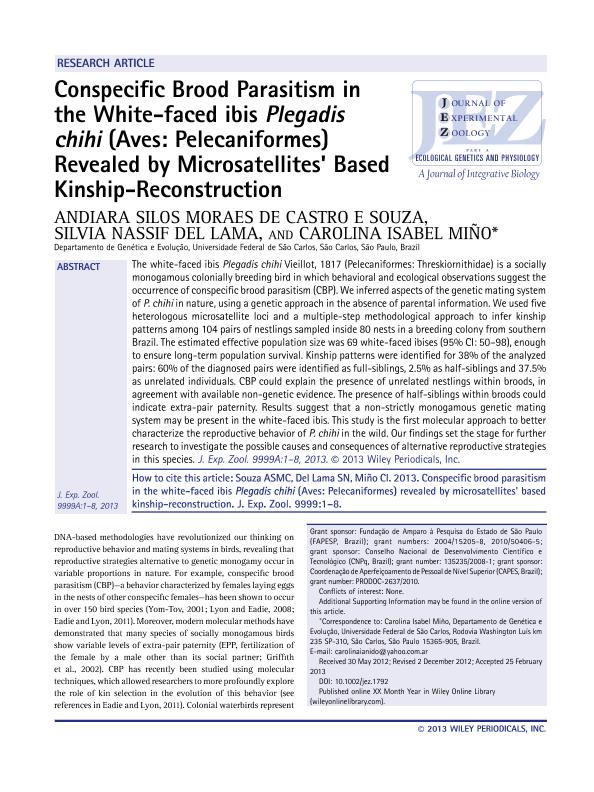Mostrar el registro sencillo del ítem
dc.contributor.author
de Castro e Souza, Andiara Silos Moraes
dc.contributor.author
Del Lama, Silvia Nassif
dc.contributor.author
Miño, Carolina Isabel

dc.date.available
2018-02-21T19:40:22Z
dc.date.issued
2013-06
dc.identifier.citation
de Castro e Souza, Andiara Silos Moraes; Del Lama, Silvia Nassif; Miño, Carolina Isabel; Conspecific Brood Parasitism in the White-faced Ibis Plegadis chihi (Aves: Pelecaniformes) Revealed by Microsatellites' Based Kinship-Reconstruction; Wiley-liss, Div John Wiley & Sons Inc; Journal of Experimental Zoology Part A: Ecological Genetics and Physiology; 319; 5; 6-2013; 277-284
dc.identifier.issn
1932-5223
dc.identifier.uri
http://hdl.handle.net/11336/36891
dc.description.abstract
The white-faced ibis Plegadis chihi Vieillot, 1817 (Pelecaniformes: Threskiornithidae) is a socially monogamous colonially breeding bird in which behavioral and ecological observations suggest the occurrence of conspecific brood parasitism (CBP). We inferred aspects of the genetic mating system of P. chihi in nature, using a genetic approach in the absence of parental information. We used five heterologous microsatellite loci and a multiple-step methodological approach to infer kinship patterns among 104 pairs of nestlings sampled inside 80 nests in a breeding colony from southern Brazil. The estimated effective population size was 69 white-faced ibises (95% CI: 50-98), enough to ensure long-term population survival. Kinship patterns were identified for 38% of the analyzed pairs: 60% of the diagnosed pairs were identified as full-siblings, 2.5% as half-siblings and 37.5% as unrelated individuals. CBP could explain the presence of unrelated nestlings within broods, in agreement with available non-genetic evidence. The presence of half-siblings within broods could indicate extra-pair paternity. Results suggest that a non-strictly monogamous genetic mating system may be present in the white-faced ibis. This study is the first molecular approach to better characterize the reproductive behavior of P. chihi in the wild. Our findings set the stage for further research to investigate the possible causes and consequences of alternative reproductive strategies in this species. J. Exp. Zool. 319A:277-284, 2013.
dc.format
application/pdf
dc.language.iso
eng
dc.publisher
Wiley-liss, Div John Wiley & Sons Inc

dc.rights
info:eu-repo/semantics/openAccess
dc.rights.uri
https://creativecommons.org/licenses/by-nc-sa/2.5/ar/
dc.subject
Mating System
dc.subject
Molecular Markers
dc.subject
Relatedness
dc.subject
Waterbirds
dc.subject.classification
Otras Ciencias Biológicas

dc.subject.classification
Ciencias Biológicas

dc.subject.classification
CIENCIAS NATURALES Y EXACTAS

dc.title
Conspecific Brood Parasitism in the White-faced Ibis Plegadis chihi (Aves: Pelecaniformes) Revealed by Microsatellites' Based Kinship-Reconstruction
dc.type
info:eu-repo/semantics/article
dc.type
info:ar-repo/semantics/artículo
dc.type
info:eu-repo/semantics/publishedVersion
dc.date.updated
2018-02-14T20:07:14Z
dc.journal.volume
319
dc.journal.number
5
dc.journal.pagination
277-284
dc.journal.pais
Estados Unidos

dc.journal.ciudad
New York
dc.description.fil
Fil: de Castro e Souza, Andiara Silos Moraes. Universidade Federal do São Carlos; Brasil
dc.description.fil
Fil: Del Lama, Silvia Nassif. Universidade Federal do São Carlos; Brasil
dc.description.fil
Fil: Miño, Carolina Isabel. Universidade Federal do São Carlos; Brasil. Consejo Nacional de Investigaciones Científicas y Técnicas; Argentina
dc.journal.title
Journal of Experimental Zoology Part A: Ecological Genetics and Physiology

dc.relation.alternativeid
info:eu-repo/semantics/altIdentifier/url/http://onlinelibrary.wiley.com/doi/10.1002/jez.1792/abstract
dc.relation.alternativeid
info:eu-repo/semantics/altIdentifier/doi/http://dx.doi.org/10.1002/jez.1792
Archivos asociados
